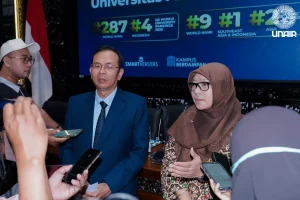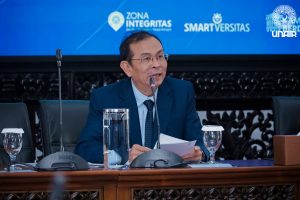UNAIR NEWS – The term “brain rot” has become a prominent concern among younger generations, particularly Generation Z. It refers to cognitive decline caused by excessive exposure to low-quality digital content. This phenomenon is increasingly viewed as a serious threat in today’s algorithm-driven digital landscape.
During the 212th Airlangga Forum, Gesang Manggala Nugraha Putra, SS, SA, MHum, a lecturer at Universitas Airlangga’s Faculty of Humanities, shared his insights on the widespread consumption of substandard content. The discussion, broadcast live on UNAIR’s Postraduate School YouTube channel on Friday, January 17, 2025, shed light on the pervasive issue.
Find balance
Putra noted that highly popular social media content often lacks depth and quality. He argued that this trend is inevitable in the digital era.
However, Putra clarified that “brain rot” is not inherently damaging if individuals can strike a balance in their digital consumption. “The key lies in maintaining equilibrium. Enjoying light, entertaining content is fine, as long as it’s not excessive. On the other hand, we can also harness social media and digital tools to access beneficial and enriching information,” he explained.
Emphasizing critical thinking
The phenomenon of “brain rot” highlights the need for young people to adopt a critical mindset when engaging with low-quality digital content. According to Putra, one of the most effective ways to combat this issue is by empowering users to take control of their media consumption.
The role of algorithms in amplifying low-quality content cannot be ignored. Social media platforms often promote widely popular content, making it more accessible to users. Nevertheless, Putra, who also serves as Coordinator of Media and Branding at UNAIR’s Center for Public Information and Communications (PKIP), emphasized that users retain the ultimate authority over the content they encounter.
“We must understand our capacity, authority, and responsibility as leaders of the algorithm. It’s crucial to utilize platform features, such as the ‘dislike’ button or ‘not interested’ options, to refine our feeds. By doing so, we can actively shape our digital environment and minimize exposure to low-quality content,” he concluded.
Author: Raissyah Fatika
Editor: Yulia Rohmawati









